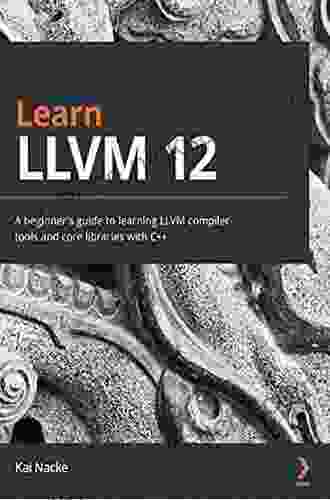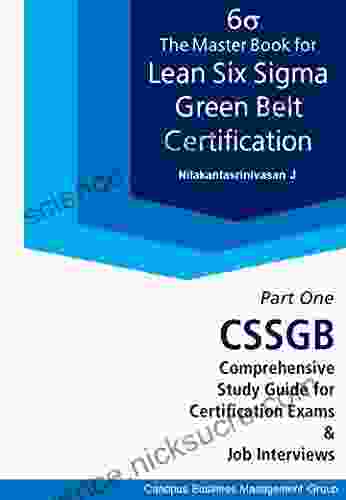Beginner Guide to Learning LLVM Compiler Tools and Core Libraries with Comprehensive Examples

The LLVM Compiler Infrastructure is a collection of modular and reusable compiler and toolchain technologies. It provides a common infrastructure for building compiler front ends, optimizers, and code generators for various programming languages and architectures. LLVM is used in a wide range of projects, including the Clang compiler, the Swift compiler, and the Rust compiler.
This guide is designed to help you get started with LLVM. We will cover the basics of LLVM, including its architecture, its core components, and how to use it to build your own compiler tools. We will also provide a number of examples that demonstrate how to use LLVM to solve real-world problems.
LLVM is a modular compiler infrastructure. This means that it is composed of a number of independent components that can be assembled in different ways to create different compilers. The core components of LLVM are:
4.2 out of 5
| Language | : | English |
| File size | : | 2442 KB |
| Text-to-Speech | : | Enabled |
| Enhanced typesetting | : | Enabled |
| Print length | : | 392 pages |
| Screen Reader | : | Supported |
- The LLVM Intermediate Representation (IR): The IR is a low-level representation of code that is independent of any particular programming language or architecture. It is used to represent the output of the front end and the input to the back end.
- The LLVM Optimizer: The optimizer is a collection of passes that can be used to improve the performance of code. The optimizer can perform a variety of optimizations, including common subexpression elimination, constant propagation, and loop unrolling.
- The LLVM Code Generator: The code generator is a component that translates the IR into machine code. The code generator can target a variety of architectures, including x86, ARM, and MIPS.
In addition to these core components, LLVM also provides a number of other tools, including a debugger, a profiler, and a disassembler. These tools can be used to help you develop and debug your compiler tools.
The best way to get started with LLVM is to download the LLVM source code and build it. The LLVM source code can be found at:
https://llvm.org/releases/download.html
Once you have downloaded the LLVM source code, you can build it by following the instructions in the LLVM documentation.
Once you have built LLVM, you can start using it to build your own compiler tools. To do this, you will need to create a new LLVM project. A new LLVM project can be created by running the following command:
llvm-project new my-project
This command will create a new directory called my-project. The my-project directory will contain a number of files, including a CMakeLists.txt file and a main.cpp file.
The CMakeLists.txt file is used to configure the build process for your project. The main.cpp file is the entry point for your project.
To build your project, you will need to run the following command:
cmake . && make
This command will build your project and create an executable file called my-project.
You can now run your project by running the following command:
./my-project
This command will run your project and print the following message:
Hello, world!
One of the most common ways to use LLVM is to create a new LLVM pass. A pass is a function that is called on each function in a module. Passes can be used to perform a variety of tasks, such as optimization, code generation, and debugging.
To create a new LLVM pass, you will need to create a new class that inherits from the llvm::Pass class. The following code shows how to create a new pass that prints the name of each function in a module:
cpp #include "llvm/Pass.h"
using namespace llvm;
namespace { struct MyPass : public Pass { static char ID;
MyPass() : Pass(ID) {}bool runOnModule(Module &M) override { for (auto &F : M){outs() X("my-pass", "My Pass");To use your new pass, you will need to add it to the pass manager. The following code shows how to add your pass to the pass manager:
cpp PassManager PM; PM.add(new MyPass()); PM.run(M);
This code will add your pass to the pass manager and run it on the module M.
In this section, we will provide a number of examples that demonstrate how to use LLVM to solve real-world problems.
Example 1: Optimizing a Function
The following example shows how to use LLVM to optimize a function. The function we will optimize is a simple function that computes the factorial of a number.
cpp int factorial(int n){if (n == 0){return 1; }else { return n * factorial(n - 1); }}
We can use LLVM to optimize this function by using the -O2 optimization level. The following code shows how to optimize the function using LLVM:
cpp #include "llvm/IR/Module.h" #include "llvm/IR/Function.h" #include "llvm/IR/BasicBlock.h" #include "llvm/IR/Instruction.h" #include "llvm/Passes/PassManager.h" #include "llvm/Transforms/Scalar.h" #include "llvm/Support/TargetSelect.h"
using namespace llvm;
int main(){LLVMInitializeAllTargetInfos(); LLVMInitializeAllTargetMCs(); LLVMInitializeAllAsmParsers();
Module M("my-module"); Function *F = Function::Create( FunctionType::get(Type::getInt32Ty(M.getContext()),{Type::getInt32Ty(M.getContext())}, false),GlobalValue::ExternalLinkage, "factorial", &M ); BasicBlock *entry = BasicBlock::Create(M.getContext(),"entry", F); IRBuilder builder(entry); Value *n = builder.CreateAlloca(Type::getInt32Ty(M.getContext())); builder.CreateStore(builder.CreateLoad(n),n); Value *result = builder.CreateAlloca(Type::getInt32Ty(M.getContext())); builder.CreateStore(builder.getInt32(1),result); BasicBlock *loop = BasicBlock::Create(M.getContext(),"loop", F); builder.CreateBr(loop); builder.SetInsertPoint(loop); Value *n_load = builder.CreateLoad(n); Value *zero = builder.getInt32(0); Value *cmp = builder.CreateICmpEQ(n_load, zero); BasicBlock *exit = BasicBlock::Create(M.getContext(),"exit", F); builder.CreateCondBr(cmp, exit, loop); builder.SetInsertPoint(loop); Value *result_load = builder.CreateLoad(result); Value *n_dec = builder.CreateSub(n_load, builder.getInt32(1)); Value *mul = builder.CreateMul(result_load, n_dec); builder.CreateStore(mul, result); builder.CreateBr(loop); builder.SetInsertPoint(exit); Value *result_load2 = builder.CreateLoad(result); builder.CreateRet(result_load2); PassManager PM; PM.add(createPromoteMemoryToRegisterPass()); PM.add(createInstructionCombiningPass()); PM.add(createCFGSimplificationPass()); PM.run(M</body></html>4.2 out of 5
| Language | : | English |
| File size | : | 2442 KB |
| Text-to-Speech | : | Enabled |
| Enhanced typesetting | : | Enabled |
| Print length | : | 392 pages |
| Screen Reader | : | Supported |
Do you want to contribute by writing guest posts on this blog?
Please contact us and send us a resume of previous articles that you have written.
 Fiction
Fiction Non Fiction
Non Fiction Romance
Romance Mystery
Mystery Thriller
Thriller SciFi
SciFi Fantasy
Fantasy Horror
Horror Biography
Biography Selfhelp
Selfhelp Business
Business History
History Classics
Classics Poetry
Poetry Childrens
Childrens Young Adult
Young Adult Educational
Educational Cooking
Cooking Travel
Travel Lifestyle
Lifestyle Spirituality
Spirituality Health
Health Fitness
Fitness Technology
Technology Science
Science Arts
Arts Crafts
Crafts DIY
DIY Gardening
Gardening Petcare
Petcare John Feinstein
John Feinstein Noel St Clair
Noel St Clair William Harding
William Harding Jay H Lefkowitch
Jay H Lefkowitch Christopher Gavigan
Christopher Gavigan Graham Bower
Graham Bower Charles J Thayer
Charles J Thayer I Johnson
I Johnson Michael Domican
Michael Domican S A Klopfenstein
S A Klopfenstein Al Roker
Al Roker Peter Irvine
Peter Irvine Daniel C Okpara
Daniel C Okpara Kate Brian
Kate Brian Dave Whitson
Dave Whitson Alana Chernila
Alana Chernila David D Burns
David D Burns Mike Martin
Mike Martin Morgan Lyle
Morgan Lyle Andre Agassi
Andre Agassi Michael Casey
Michael Casey Jonathan White
Jonathan White Christopher Hellman
Christopher Hellman Tim Gallagher
Tim Gallagher Sara Wickham
Sara Wickham Lisa Newton
Lisa Newton Tina Dreffin
Tina Dreffin Terry Funk
Terry Funk Massad Ayoob
Massad Ayoob Pallas Snider
Pallas Snider David F Kelly
David F Kelly Arthur Fleischmann
Arthur Fleischmann Jack Nicklaus
Jack Nicklaus Kelly Jensen
Kelly Jensen Cat Warren
Cat Warren John Bird
John Bird Christopher Willard
Christopher Willard Snap Summaries
Snap Summaries Anne Enright
Anne Enright Trevor Lund
Trevor Lund Antipodean Writer
Antipodean Writer Anne Dachel
Anne Dachel Lo Bosworth
Lo Bosworth Dusty Rhodes
Dusty Rhodes Kiku Hughes
Kiku Hughes Erin Lovelace
Erin Lovelace Nancy Hughes
Nancy Hughes Will Storr
Will Storr Jessica Cornwell
Jessica Cornwell G E R Lloyd
G E R Lloyd Alan E Sparks
Alan E Sparks Karen Levin Coburn
Karen Levin Coburn Benjamin Johnston
Benjamin Johnston Jon Emmett
Jon Emmett Belinda Luscombe
Belinda Luscombe Arnold Yates
Arnold Yates Elaine Howard Ecklund
Elaine Howard Ecklund Andrew Jamieson
Andrew Jamieson Sir Edmund Hillary
Sir Edmund Hillary William Foote Whyte
William Foote Whyte Katharine Graves
Katharine Graves Spencer Wells
Spencer Wells Ilan Dvir
Ilan Dvir Clyde Fitch
Clyde Fitch J Zoltan
J Zoltan Caitlin Zaloom
Caitlin Zaloom Leif K Karlsen
Leif K Karlsen Jordon Greene
Jordon Greene Sam J Fires
Sam J Fires Christopher Scordo
Christopher Scordo Elizabeth Thompson
Elizabeth Thompson Jane Poynter
Jane Poynter Dr Joseph Parent
Dr Joseph Parent Jerry Robeson
Jerry Robeson Celeste Headlee
Celeste Headlee Timothy C Smith
Timothy C Smith Alan C Acock
Alan C Acock Dan Dipiro
Dan Dipiro Gayle Peterson
Gayle Peterson Gavin Francis
Gavin Francis Princess Her
Princess Her Kevin B Shearer
Kevin B Shearer Conor Daly
Conor Daly Paul G Schempp
Paul G Schempp Alan Gelb
Alan Gelb Gillian Gill
Gillian Gill Joyce Burkhalter Flueckiger
Joyce Burkhalter Flueckiger Brian Mills
Brian Mills Ndeye Labadens
Ndeye Labadens Peter Hathaway Capstick
Peter Hathaway Capstick Vanessa Ogle
Vanessa Ogle Ai Publishing
Ai Publishing Howard Hill
Howard Hill Emeran Mayer
Emeran Mayer Bill Parisi
Bill Parisi Kidada Jones
Kidada Jones James Willard Schultz
James Willard Schultz Kerstin Gier
Kerstin Gier David King
David King Lee Carroll
Lee Carroll Bettina Gordon Wayne
Bettina Gordon Wayne Aitzaz Imtiaz
Aitzaz Imtiaz Mark Goulston
Mark Goulston Bobby Flay
Bobby Flay Tonya Johnston
Tonya Johnston Madeline Milne
Madeline Milne Lisa Marasco
Lisa Marasco Alana Mclaren
Alana Mclaren Alan Hearnshaw
Alan Hearnshaw Kevin Hunter
Kevin Hunter Hiro Ainana
Hiro Ainana Michael Shermer
Michael Shermer Robert M Emerson
Robert M Emerson Robin Mckinley
Robin Mckinley Sophia Joy
Sophia Joy Robert Macfarlane
Robert Macfarlane Dmitry Zinoviev
Dmitry Zinoviev Harold Klemp
Harold Klemp Peg Tyre
Peg Tyre Orson Scott Card
Orson Scott Card Tenth Edition Revised Kindle Edition
Tenth Edition Revised Kindle Edition Contractor Education Inc
Contractor Education Inc Linda Welters
Linda Welters Thubten Chodron
Thubten Chodron Alan S Kaufman
Alan S Kaufman Chris Bowers
Chris Bowers Amelia Mayer
Amelia Mayer Hope Smith
Hope Smith Hervey Garrett Smith
Hervey Garrett Smith Bob Mayer
Bob Mayer Mark Harris
Mark Harris Letisha Galloway
Letisha Galloway Marc M Triola
Marc M Triola Al Barkow
Al Barkow Matt Mosher
Matt Mosher Sheila Barton
Sheila Barton Pantea Kalhor
Pantea Kalhor Gina Guddat
Gina Guddat Roxy And Ben Dawson
Roxy And Ben Dawson Thomas Metzinger
Thomas Metzinger Martin J Pring
Martin J Pring Margit Ystanes
Margit Ystanes Joe Clement
Joe Clement Angelina Wilson
Angelina Wilson The Rogue Hypnotist
The Rogue Hypnotist Suze Guillaume
Suze Guillaume Amanda Ford
Amanda Ford Brenda Nathan
Brenda Nathan Louis Schubert
Louis Schubert George Plimpton
George Plimpton Skeleton Steve
Skeleton Steve Hammad Fozi
Hammad Fozi Bruce Lee
Bruce Lee G H Hardy
G H Hardy Takuan Soho
Takuan Soho John J Miller
John J Miller Peter Ballingall
Peter Ballingall Judith Garrard
Judith Garrard Alfred S Posamentier
Alfred S Posamentier George Buehler
George Buehler Aidan Comerford
Aidan Comerford Layla Moon
Layla Moon Rebekah Sack
Rebekah Sack United States Government Us Marine Corps
United States Government Us Marine Corps Markus Rex
Markus Rex Megan Gray Md
Megan Gray Md Nina Lacour
Nina Lacour Denise Alvarado
Denise Alvarado Alan Margot
Alan Margot Larry Wasserman
Larry Wasserman Alan Lawrence Sitomer
Alan Lawrence Sitomer Edupan7 Publishing
Edupan7 Publishing Steve Moore
Steve Moore Mendocino Press
Mendocino Press James F Boswell
James F Boswell Jessica Battilana
Jessica Battilana Jill Homer
Jill Homer Julie Bradley
Julie Bradley Zondervan
Zondervan David Crabtree
David Crabtree Jacqueline Fitzpatrick
Jacqueline Fitzpatrick Christos A Djonis
Christos A Djonis David Roberts
David Roberts Martin Rooney
Martin Rooney E Cheng
E Cheng Original Edition Kindle Edition
Original Edition Kindle Edition Aja Raden
Aja Raden Kate Bettison
Kate Bettison Stephen Wolfram
Stephen Wolfram Patrick O Sullivan
Patrick O Sullivan Celeste Jones
Celeste Jones Bob Plott
Bob Plott Mel Thompson
Mel Thompson Esther Parry
Esther Parry Daphne Rose Kingma
Daphne Rose Kingma Alan Murchison
Alan Murchison Alan Watts
Alan Watts Al Owens
Al Owens Jakob Tanner
Jakob Tanner Ged Jenkins Omar
Ged Jenkins Omar Douglas Noll
Douglas Noll Ahmed Osman
Ahmed Osman Natazha Raine O Connor
Natazha Raine O Connor Gordon R Dickson
Gordon R Dickson Cindy Hudson
Cindy Hudson Al Ristori
Al Ristori David Vine
David Vine Andrew Blum
Andrew Blum Zita West
Zita West Eden O Neill
Eden O Neill Mista Nove
Mista Nove Al Desetta M A
Al Desetta M A Al Pasha
Al Pasha M K Hume
M K Hume Bruce J Macfadden
Bruce J Macfadden Timm Woods
Timm Woods Rose Lynn Fisher
Rose Lynn Fisher Tom Shachtman
Tom Shachtman John Muir
John Muir Jay Revell
Jay Revell Laurie Pickard
Laurie Pickard Aileen Nielsen
Aileen Nielsen Chris Vines
Chris Vines Akwaeke Emezi
Akwaeke Emezi Jane P Gardner
Jane P Gardner Jessica Cunsolo
Jessica Cunsolo Alan Rouse
Alan Rouse Jeff Maynard
Jeff Maynard We Fairbairn
We Fairbairn Aphra Behn
Aphra Behn Andrew Rowe
Andrew Rowe James Witts
James Witts Lex Croucher
Lex Croucher Nick Hughes
Nick Hughes John Irving
John Irving Jan Smith
Jan Smith Nilakantasrinivasan J Neil
Nilakantasrinivasan J Neil Janice Selekman
Janice Selekman Mackenzi Lee
Mackenzi Lee Farlex International
Farlex International Martin Erwig
Martin Erwig Dylan Alcott
Dylan Alcott Kai Nacke
Kai Nacke Melissa Bashardoust
Melissa Bashardoust Alan Burdick
Alan Burdick Vernon Coleman
Vernon Coleman Nassim Nicholas Taleb
Nassim Nicholas Taleb E A Koetting
E A Koetting Andrea Travillian
Andrea Travillian Aiva Books
Aiva Books Publishdrive Edition Kindle Edition
Publishdrive Edition Kindle Edition Dr David Geier
Dr David Geier Micky Ward
Micky Ward Anahad O Connor
Anahad O Connor Mariam N Ottimofiore
Mariam N Ottimofiore John T Hansen
John T Hansen Alaina Talboy
Alaina Talboy J R Haseloff
J R Haseloff Sonia Nazario
Sonia Nazario Dawn Sakamoto Paiva
Dawn Sakamoto Paiva Anna Hickey Moody
Anna Hickey Moody Isabella Morris
Isabella Morris Jane Bottomley
Jane Bottomley Gary Smith
Gary Smith Alastair Humphreys
Alastair Humphreys Howard Greene
Howard Greene Erin Ekins
Erin Ekins Andy Adams
Andy Adams Nick Lyons
Nick Lyons Gary B Ferngren
Gary B Ferngren Dr Guy Leschziner
Dr Guy Leschziner Lauren Blackwood
Lauren Blackwood Arnold Haultain
Arnold Haultain Edward A Tiryakian
Edward A Tiryakian Alex Light
Alex Light Amelia Simmons
Amelia Simmons Beata Bliss Lewis Md
Beata Bliss Lewis Md Jackson Katz
Jackson Katz Rene D Zweig
Rene D Zweig Alan Lightman
Alan Lightman Billy Walsh
Billy Walsh Joe Berardi
Joe Berardi Rebecca Jones
Rebecca Jones Gary Player
Gary Player Aileen Evans
Aileen Evans W E Fairbairn
W E Fairbairn Betsy Tobin
Betsy Tobin Howard Maxwell
Howard Maxwell Helena Clare
Helena Clare Donald Woods Winnicott
Donald Woods Winnicott Samuel N Rosenberg
Samuel N Rosenberg Po Bronson
Po Bronson Bianca Smith
Bianca Smith Michal Stawicki
Michal Stawicki Lj Andrews
Lj Andrews Harriet Brown
Harriet Brown Ken Denmead
Ken Denmead R A Salvatore
R A Salvatore Robert Heidler
Robert Heidler Frances E Jensen
Frances E Jensen Michael Freedland
Michael Freedland Deitra Leonard Lowdermilk
Deitra Leonard Lowdermilk Matthew Sturm
Matthew Sturm Penney Peirce
Penney Peirce Shaun Tomson
Shaun Tomson Robert L Kelly
Robert L Kelly Joe Bertagna
Joe Bertagna Sara Hanover
Sara Hanover Mike Warren
Mike Warren Vishwesh Bhatt
Vishwesh Bhatt Lecile Harris
Lecile Harris Constance Classen
Constance Classen Mark Drolsbaugh
Mark Drolsbaugh Alan Vermilye
Alan Vermilye Gregory J Davenport
Gregory J Davenport Lingo Mastery
Lingo Mastery Alan Shipnuck
Alan Shipnuck Olivia Gentile
Olivia Gentile Molly Absolon
Molly Absolon Kiersten White
Kiersten White Douglas T Hall
Douglas T Hall Hannah Ewens
Hannah Ewens Michael Miller
Michael Miller Marcus Chown
Marcus Chown Alan Garner
Alan Garner Al Yellon
Al Yellon John Leo
John Leo Amy Edelstein
Amy Edelstein Rehana Jawadwala
Rehana Jawadwala Kareem Abdul Jabbar
Kareem Abdul Jabbar Habeeb Quadri
Habeeb Quadri Matthew Mcbee
Matthew Mcbee Craig Childs
Craig Childs Dimitri Loose
Dimitri Loose Mike Rothschild
Mike Rothschild Alan Graham
Alan Graham Shoshana Levin Fox
Shoshana Levin Fox Taquetta Baker
Taquetta Baker Sarah Hendrickx
Sarah Hendrickx Melinda Rushe
Melinda Rushe Dave Heller
Dave Heller Al Strachan
Al Strachan Stephanie Izard
Stephanie Izard Jacqueline Church Simonds
Jacqueline Church Simonds Terry L Duran
Terry L Duran Jeanne Faulkner
Jeanne Faulkner Mark Booth
Mark Booth David A Sousa
David A Sousa Scott Surovich
Scott Surovich George Knudson
George Knudson Helen Palmer
Helen Palmer Steven H Strogatz
Steven H Strogatz Michael D Rich
Michael D Rich Shing Tung Yau
Shing Tung Yau Charlotte Markey
Charlotte Markey Kim Stanley Robinson
Kim Stanley Robinson Erica Westly
Erica Westly Deborah Harkness
Deborah Harkness Aidan Chambers
Aidan Chambers Andy Zipser
Andy Zipser 12th Edition Kindle Edition
12th Edition Kindle Edition Alan R Hall
Alan R Hall Terry Breverton
Terry Breverton Jill Stamm
Jill Stamm Nicholas Romanov
Nicholas Romanov Jonathan Gottschall
Jonathan Gottschall Aidan Dodson
Aidan Dodson Robert A Sadowski
Robert A Sadowski William A Kaplin
William A Kaplin Kevin Williams
Kevin Williams Gail Tully
Gail Tully Bradley Efron
Bradley Efron Kardas Publishing
Kardas Publishing Jacob K Olupona
Jacob K Olupona Roy Dittmann
Roy Dittmann Emily Harris Adams
Emily Harris Adams Alan Booth
Alan Booth Steve Michalik
Steve Michalik Lexie Scott
Lexie Scott Joanne Webb
Joanne Webb Aimee Aristotelous
Aimee Aristotelous Robert E Stake
Robert E Stake James A Michener
James A Michener Alan E Kazdin
Alan E Kazdin Vasilis Konstantinos Giontzis
Vasilis Konstantinos Giontzis Linda G Morris
Linda G Morris Thomas Kurz
Thomas Kurz Aileen Erin
Aileen Erin Saul Rip
Saul Rip Michael W King
Michael W King Charles B White
Charles B White Truman Everts
Truman Everts Magnus Thollander
Magnus Thollander James Gleick
James Gleick Martin Luther King Jr
Martin Luther King Jr Anthonissa Moger
Anthonissa Moger Carol Tuttle
Carol Tuttle Miles Mckenna
Miles Mckenna Leigh Sales
Leigh Sales Jay Annelli
Jay Annelli Janet Houser
Janet Houser Jim Steenburgh
Jim Steenburgh Alice Scordato
Alice Scordato Michael Gray
Michael Gray Len Sperry
Len Sperry Percy Boomer
Percy Boomer Alan S Gurman
Alan S Gurman Albert Einstein
Albert Einstein Eddy Starr Ancinas
Eddy Starr Ancinas Florence Williams
Florence Williams Gary R Varner
Gary R Varner Samuel Carbaugh
Samuel Carbaugh Mykel Hawke
Mykel Hawke Rob Casey
Rob Casey Carl Gustav Jung
Carl Gustav Jung Stephen M Camarata
Stephen M Camarata Al Marlowe
Al Marlowe Barbara Oehlberg
Barbara Oehlberg Ron L Deal
Ron L Deal Rosemarie Anderson
Rosemarie Anderson Ken Schultz
Ken Schultz Satya Sundar Sethy
Satya Sundar Sethy Bryon Powell
Bryon Powell Lisa Kenney
Lisa Kenney Susan B Lovejoy
Susan B Lovejoy Courtney Macavinta
Courtney Macavinta Noha Mellor
Noha Mellor David Jason
David Jason Steven Horak
Steven Horak Kerry Diamond
Kerry Diamond Cynthia Clumeck Muchnick
Cynthia Clumeck Muchnick Teresa Mccallum
Teresa Mccallum Don Casey
Don Casey Tod E Bolsinger
Tod E Bolsinger Ann Hagedorn
Ann Hagedorn Akil Palanisamy
Akil Palanisamy Jerry Robertson
Jerry Robertson Theodore P Jorgensen
Theodore P Jorgensen Clint Emerson
Clint Emerson Rick Bass
Rick Bass Jon Tyson
Jon Tyson Barbara Scott
Barbara Scott S Connolly
S Connolly Toby Wilkinson
Toby Wilkinson Damon Lee
Damon Lee Bill Friedrich
Bill Friedrich Jamie Baulch
Jamie Baulch George M Fredrickson
George M Fredrickson Al Sweigart
Al Sweigart Douglas G Altman
Douglas G Altman Richard Pears
Richard Pears Jay Speight
Jay Speight George E Andrews
George E Andrews Franz Metcalf
Franz Metcalf Collins Easy Learning
Collins Easy Learning Judy Jewell
Judy Jewell Catherine Belknap
Catherine Belknap Jenni Hicks
Jenni Hicks Pavel Tsatsouline
Pavel Tsatsouline Michael Morpurgo
Michael Morpurgo George Monbiot
George Monbiot Meredith Marsh
Meredith Marsh Bryan Mann
Bryan Mann Margaret J Wheatley
Margaret J Wheatley Carla Schroder
Carla Schroder Juno Roche
Juno Roche Sandy Lindsey
Sandy Lindsey Brandy Roon
Brandy Roon Yang Jwing Ming
Yang Jwing Ming Dean Burnett
Dean Burnett Jeremy Miles
Jeremy Miles Helen Hollick
Helen Hollick Michael Sidgwick
Michael Sidgwick Steven Trimble
Steven Trimble Anders Halverson
Anders Halverson Ainsley Arment
Ainsley Arment Alan Porter
Alan Porter Rand Cardwell
Rand Cardwell Chris Klug
Chris Klug Juliet Marillier
Juliet Marillier Mark Occhilupo
Mark Occhilupo Bill Walker
Bill Walker Kristine Barnett
Kristine Barnett Josh Kilmer Purcell
Josh Kilmer Purcell Al Macy
Al Macy Paramahansa Yogananda
Paramahansa Yogananda John H Moore
John H Moore Gordon H Orians
Gordon H Orians Alice Oseman
Alice Oseman John Riley
John Riley Gill Rapley
Gill Rapley Vera Nazarian
Vera Nazarian Doug Gelbert
Doug Gelbert Wayne Stewart
Wayne Stewart Donna Morang
Donna Morang Grace Lebow
Grace Lebow Mary Basick
Mary Basick Dorothy H Crawford
Dorothy H Crawford Jacqueline Tourville
Jacqueline Tourville Amye Archer
Amye Archer Marsha Wenig
Marsha Wenig Francesca Lia Block
Francesca Lia Block Frank E Harrell Jr
Frank E Harrell Jr Dennis Jarecke
Dennis Jarecke
Light bulbAdvertise smarter! Our strategic ad space ensures maximum exposure. Reserve your spot today!

 Ralph Waldo Emerson10 Classic Western Stories by Andy Adams: A Literary Roundup of the American...
Ralph Waldo Emerson10 Classic Western Stories by Andy Adams: A Literary Roundup of the American... Hunter MitchellFollow ·8k
Hunter MitchellFollow ·8k Gabriel BlairFollow ·17.4k
Gabriel BlairFollow ·17.4k Angelo WardFollow ·19.3k
Angelo WardFollow ·19.3k Hassan CoxFollow ·4.2k
Hassan CoxFollow ·4.2k Eddie PowellFollow ·19.5k
Eddie PowellFollow ·19.5k Edgar CoxFollow ·10.3k
Edgar CoxFollow ·10.3k Julio Ramón RibeyroFollow ·2.3k
Julio Ramón RibeyroFollow ·2.3k Bradley DixonFollow ·9.6k
Bradley DixonFollow ·9.6k

 Deacon Bell
Deacon BellCompilation of Short Stories on Mental Illness and Ways...
Mental illness is a serious issue that affects...

 Jonathan Hayes
Jonathan HayesThe Practical Guide to Raising Courageous and...
As parents, we all want...

 Carlos Fuentes
Carlos FuentesA Journey to Remember: The High Sierra Love Story of...
Prologue: A Wilderness Encounter Beneath...

 Douglas Foster
Douglas FosterEndless Conquest: Embark on an Immersive Dungeon Crawl in...
Endless Conquest is a captivating LitRPG...

 Caleb Long
Caleb LongThe Special and the General Theory 100th Anniversary...
The year 2015 marks a...
4.2 out of 5
| Language | : | English |
| File size | : | 2442 KB |
| Text-to-Speech | : | Enabled |
| Enhanced typesetting | : | Enabled |
| Print length | : | 392 pages |
| Screen Reader | : | Supported |












